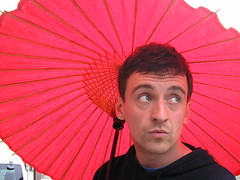Mary Newton has recently written a rebuke of
an article which appeared in the Daily Yomiuri on the 9th of February. Within, James W. Porcaro, Professor of English as a Foreign Language at Toyama University of International Studies, calls for an end to the Assistant Language Teacher (ALT) program (provided by
JET and various private companies) on the grounds that it is a massive waste of money with little in the way of observable benefits.
The basis for his argument is a pessimistic criticism of Michael Auslin, a former ALT (from 1991-'92) who, as Prof. Porcaro neglects to mention, is himself a Professor at Yale. The picture Porcaro paints from Auslins remarks that he had
"few responsibilities" and
"a lot of fun", combined with his own opinions that the
"fun and games" had by students in English class are in fact
"detrimental" portrays ALT's as workshy graduates, looking for one more opportunity to slack off before they have to find jobs. Porcaro states that Auslin, and a total of 9,000 ALT's,
"...continue to demonstrate the same lack of educational value...at an annual cost of about 50 billion yen to Japan's taxpayers."In an ideal situation, ALT's and their counterparts, the Japanese Teachers of English (JTE's) are supposed to present a "double act" in order to put an emphasis on communication, rather than learning grammar by rote, which doesn't necessarily aid conversation skills. The core of an effective English lesson with a JTE and an ALT is a good working relationship, but this isn't always possible for a variety of reasons.
For starters, I've been visiting four schools this year. No matter how good your relationship with the JTE is, it is impossible to be a consistent benefit to the students, because every other week, the ALT goes to a different school. When they return, the students and the JTE have adopted a routine that works without the ALT because they aren't there most of the time. Efforts are made to include the "guest", but usually these don't stray beyond the "human tape recorder" phenomenon.
Elaborating on the JTE/ALT relationship, very often, even with the most experienced JTE, they still make obscene errors of grammar. Some JTE's are hardly the
"models of English-language" Porcaro describes. The ALT is useful because they represent an opportunity to communicate with the correct grammar. If the teacher is getting it wrong on the assumption that they're not, then they'll give this erroneous information to the students, which itself is deterimental to
"cultivating Japanese with English abilities".
Prof. Porcoro dislikes the manner in which English is taught by ALT's, through the use of games,
"...as they merely reinforce the impression that learning English is not an important and serious endeavor..."but a way needs to be found that makes the subject appealing to students. Many children don't see the point of learning an alien language spoken in countries on the other side of the planet. The serious approach apparently favoured by Prof. Porcaro could potentially be another opportunity for students to sleep in the middle of class, rather than a chance to get involved in speaking.
Prof. Porcaro suggests that the money thrown at ALT programs would be better spent on more training for JTE's, but I know few of these overworked and underpaid public servants who have time to spare. Also, on a broader level, there is the fundamental fallacy of "education for all" - the fact is that the only students who will be good at english are those who are interested in it, and no amount of penny pinching will change that.
He also complains that the prescence of ALT's,
"...marginalizes and diminishes the role of JTEs in front of their own students..."as if the JTE's were the most important thing in the classroom. Education is not about the
"professional growth and development" of the teachers; it is about educating students.
What Prof. Porcaro completely misses is the cultural benefits of ALT programs. This is a opportunity for genuine cultural exchange on both sides. As many ex-JET ALT's have said to me, the JET program is less about English language education and more about introducing Japan to the rest of the world. Professor Porcaro's proposals completely erase this benefit for both students in a relatively isolated society and foreign visitors with a lot to learn.
Labels: anger, I wasn't expecting that, Japan, school, teaching, that job they make me do



.jpg)
.jpg)
.jpg)

.jpg)
.jpg)



